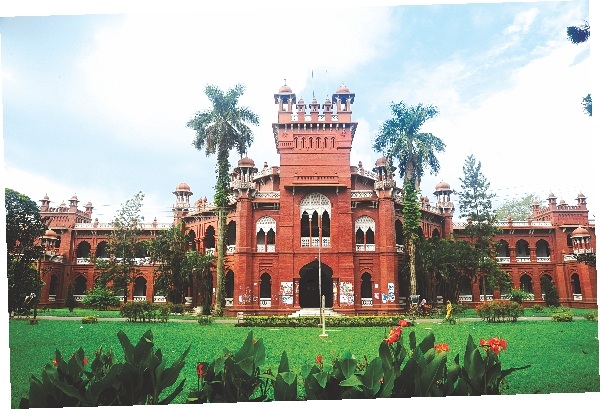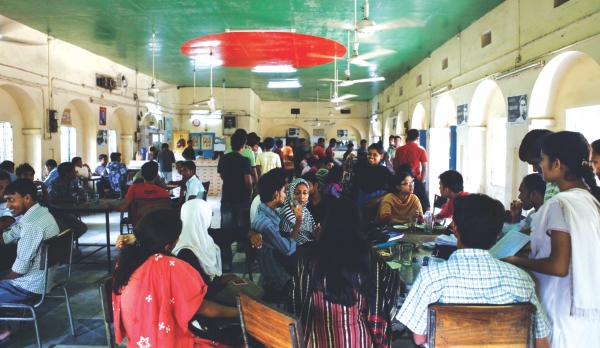Opinion
 |
Curzon Hall, the prominent establishment of Dhaka University |
Caught Dead in the Middle
Sumaiya Ahsan Bushra
Photos : Anisur Rahman
In a developing nation, economic, social and political problems are bound to exist. Be it a political uprising or a serious lack in maintaining educational standards, problems of such are omnipresent. While the nation's private universities strive to maintain their standards thanks to private financing, the public universities are seriously lagging behind, in spite of state financing. In recent times, the oldest and the most renowned public university of Bangladesh, Dhaka University (DU) has failed to standardise education. The severity of the statement might be extreme but ignorance on behalf of the administration cannot be ignored either.
The entrance exams at Dhaka University have, for years, been the trickiest. Most of the students after passing their Higher Secondary Certificate board exams set out to study for the challenging exams, with the expectation that they would ace it, they spend almost three months studying for the exams. Unfortunately, many of them had 'mistakenly' failed this time because of the DU admission authorities own callousness.
A few weeks ago, the admission test of the Ga unit, (section C) Business Administration examination was held at Dhaka University. Accidentally, or other wise the question paper of the English section was wrongly formatted as the options for the multiple choice question answer were completely wrong and inaccurate. After the results were posted, a large number of students found themselves failing, which was unexpected and unnatural. The students filed a complaint stating that the university authorities must have made a mistake because it is nearly impossible to fail in this manner. Some people had received a mark of three out of a total of 25 in English which did not seem likely.

Students interacting inside Dhaka University.
After a few weeks, the university cancelled the first results and on November 2, 2011, the university re-assessed the answer sheets and posted fresh results and the number of students who got admitted increased significantly. This result was based on the number of incorrect answers marked as correct. This issue was further taken to the High Court (HC), as it no longer remained an issue of the university alone. The confusion was resolved by the HC's decision for passing order on a writ petition that challenged the university authorities' decision to cancel its Ga unit admission test results.
According to the Daily Star reports, Professor Anwar Hossain of DU and Dr Zafar Iqbal of Shahjalal University of Science and Technology (SUST) opined that the examination scripts can be re-evaluated excluding the questions with errors. Professor Hossain, who represents the Dhaka University Teachers' Association (DUTA) as president stated that the members of DUTA have suggested two options. One would be to re-evaluate the existing examination papers and the other would be to hold a fresh admission test.
This entire incident has left a deep impact on the students all over Bangladesh. The students who sat for this admission test are concerned not only about their own prospect but also about the bleak future of the country. The question raised by many, is that if the nation's best university, Dhaka University, which for years has been the role model for both private and public universities, is lagging behind in its standards in setting a simple question paper then what can be expected from the rest?
On this notion, Mohiuddin, one of the students who appeared for the entrance exam in the Ga unit, states, “In general no exam is perfect; at least as students our expectations are always a little uncertain, but then failing is different. I failed in English which was not possible because I had answered all 25 questions regardless of the fact that if one of them was wrong, I would be penalised for negative marking. I knew for sure that I would pass in English at least with 12-13 marks. Two days later, I hear the university had posted new results which surprised me as this time I had passed. This whole confusion was surprising and unexpected. This could have happened to any university but not DU.” Mohiuddin further expresses, “We are still in uncertainty because we were told that a fresh admission test might be held. This has created a problem because I got accepted at Jahangirnagar University for a subject that I don't want to study and now if I don't get admission and the third time DU decides to publish the grades, I will be in trouble.”
Another student, Tasmi, says, “Honestly, I did not expect this to happen. It is not our fault that the examiners did not set the question papers properly. Why are we suffering because of this mix-up? One day, we know we didn't get in, the next day we find out otherwise. This is disappointing. For a lot of people who hoped they would get into DU and missed the admission test for other public universities, a whole year of their academic life is going to be wasted.”
As of now, students are still in a dilemma. Earlier, Additional Attorney MK Rahman and DU counsel Advocate AFM Mesbahuddin spoke in favour of a new admission test under Ga unit so that no stigma against the DU admission process remains, while on the other hand, Petitioners' counsel Manzill Murshid opined that there is no scope to cancel the result of the admission test and chances of a new admission is also very low since the DU authorities have already selected subjects for qualifying candidates. However, a recent development on December 4 stated that the DU authorities appealed against the court order to re-evaluate the results. The authorities have decided to not opt for the re-evaluation but to hold a fresh test on December 9. This decission was further finalised by the Supreme Court on December 7.
Both Mohiuddin and Tasmi say that the students giving the exams are not machines and they refuse to be treated in this way. "Why have another admission test?" they ask. "The authorities have come up with fresh results after cancelling the first batch. Why not just stick to the latest results?" Such types of questions are arising everywhere amongst students who had appeared for the exams this year and who also plan to appear in the near future. No matter what the authorities decide, the losers here are the students. While some can afford a private university education, a large number of them cannot. For those, who yearn for a standard education in a public university or those who cannot afford a private university education, this whole incident has given birth to a new crisis, amongst all the 'third world crisis' that young people go through.
|
|
|
